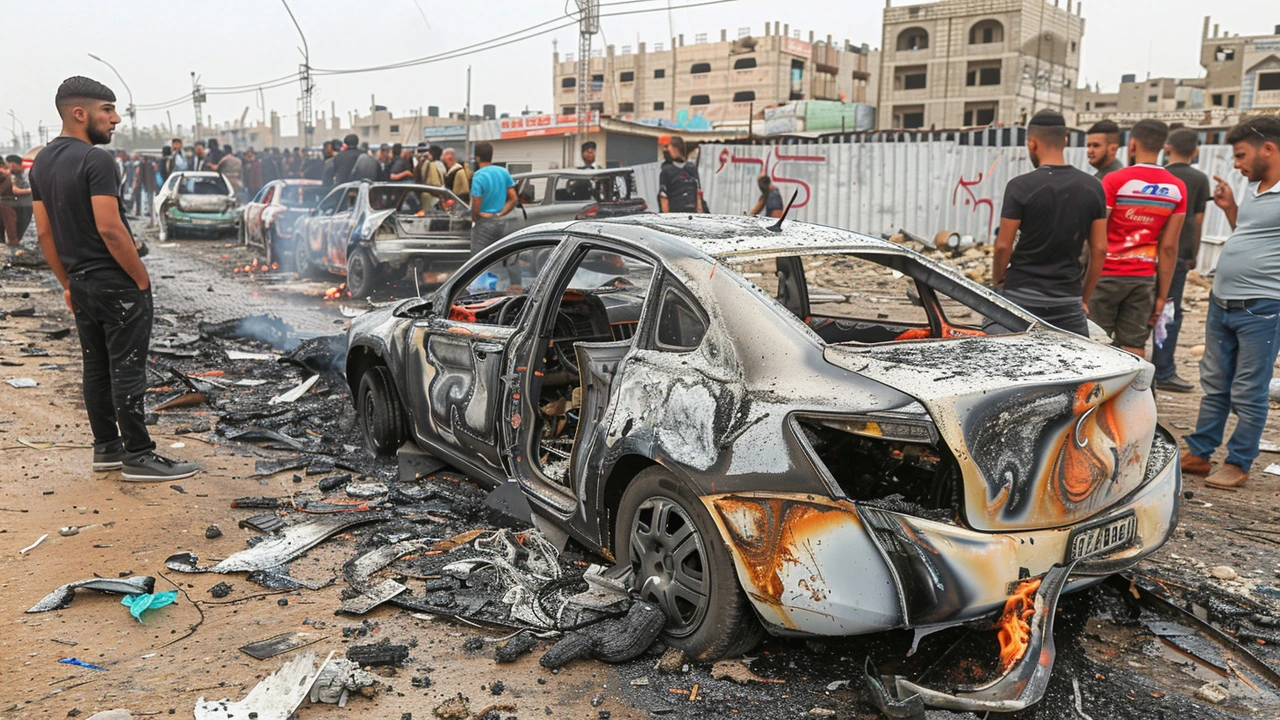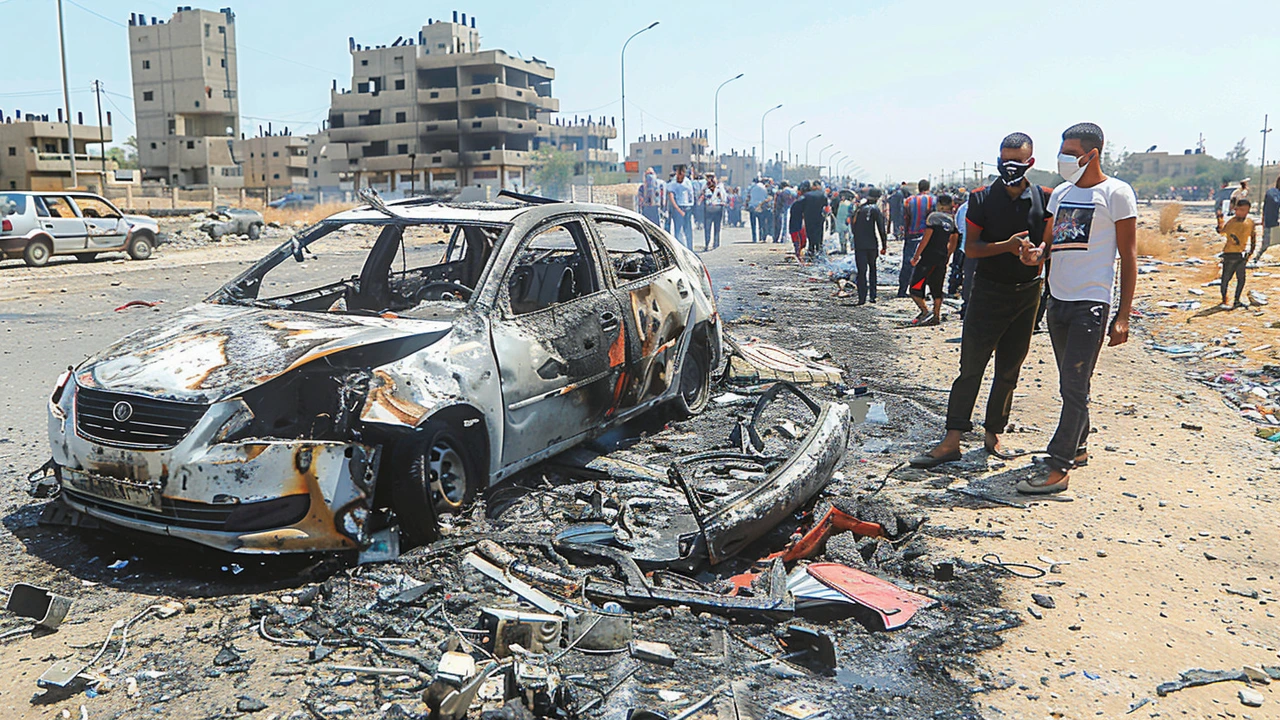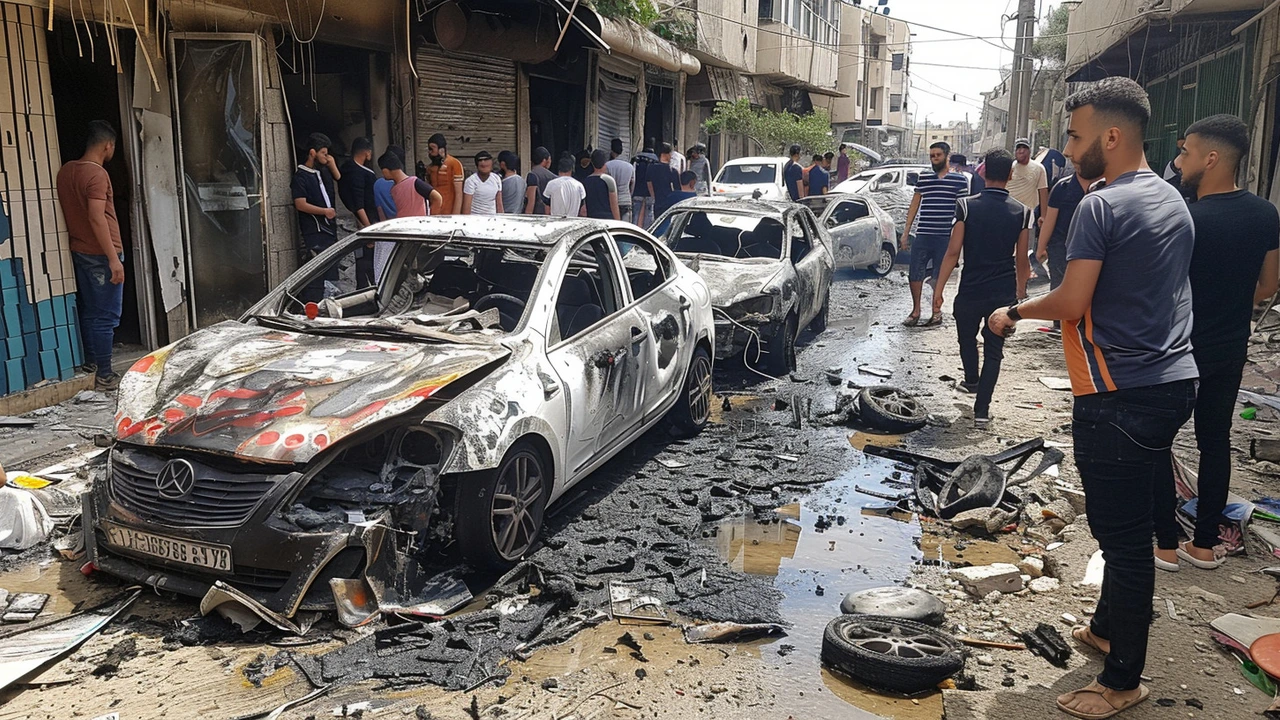Introduction
The ongoing conflict in Gaza, particularly in the city of Rafah, has garnered widespread international condemnation as Israel continues its airstrikes despite a directive from the International Court of Justice (ICJ) to cease military operations. This directive was issued in response to concerns over the potential physical destruction of the Palestinian group in Gaza. Despite the ruling and global calls for an end to the violence, Israel has vowed to press on, citing security concerns and the need to combat threats from Hamas.
The Situation in Rafah
Rafah, a city in the southern part of Gaza, has become a focal point of the current conflict. The Israeli offensive has led to the deaths of at least 45 people and has injured 200 more in a tent camp housing displaced individuals. These figures highlight the severe human cost of the ongoing military operations. The ICJ's ruling to halt the offensive was aimed at protecting civilian lives and preventing further destruction, yet the violence continues unabated.
International Response
The response from the global community has been one of significant outrage and condemnation. Countries such as the United States, Egypt, Jordan, Saudi Arabia, Turkey, and Qatar have all called for an immediate ceasefire and the protection of civilians. These governments have emphasized the need for a peaceful resolution to the conflict and have urged Israel to comply with the ICJ ruling. The United Nations Relief and Works Agency for Palestine Refugees in the Near East (UNRWA) has reported that approximately one million people have been displaced by the Israeli offensive in Rafah since early May. This mass displacement has led to a humanitarian crisis, with many Palestinians feeling vulnerable and unsafe wherever they seek refuge.

Social Media Outcry
The global outrage has also been reflected on social media platforms, where the phrase "All eyes on Rafah" has been trending. This grassroots movement aims to draw attention to the plight of Palestinians in Rafah and to put pressure on the international community to take decisive action. The widespread use of this hashtag shows the power of social media in mobilizing support and raising awareness about critical issues.
Symbolic Moves by Nations
In a remarkable move of solidarity, Spain and Norway have officially recognized the state of Palestine. This symbolic gesture aims to support the Palestinian cause and promote a peaceful resolution to the conflict. Ireland is expected to follow suit, further highlighting the growing international support for Palestinian statehood. These recognitions are seen as a step towards fostering peace between Palestinians and Israelis and finding a lasting solution to the decades-long conflict.
The Origins of the Conflict
The recent escalation in Gaza originated from a Hamas attack on southern Israel in October. This attack resulted in the deaths of over 1,170 people and prompted a significant retaliatory offensive by Israel. The subsequent Israeli strikes have led to the deaths of at least 36,050 people in Gaza, with a majority being civilians, and have injured 81,136 others. The scale of the destruction and loss of life has intensified calls for a ceasefire and immediate humanitarian assistance for those affected by the conflict.

Humanitarian Concerns
The humanitarian situation in Gaza is dire. The continuous airstrikes have disrupted daily life, destroyed infrastructure, and decimated essential services. Access to clean water, medical care, and basic supplies has become increasingly challenging, exacerbating the suffering of the civilian population. International organizations and humanitarian agencies are struggling to provide aid due to the volatile security situation, and the urgent need for a ceasefire cannot be overstated.
Calls for Immediate Action
As the conflict rages on, the international community's calls for immediate action are growing louder. There is an urgent need for all parties involved to prioritize civilian protection and work towards a peaceful resolution. Diplomatic efforts must be intensified to ensure compliance with the ICJ ruling and to alleviate the humanitarian crisis in Gaza. The voices of those demanding peace, justice, and accountability must be heard, and concerted efforts must be made to achieve a lasting and sustainable resolution to the conflict.

Anita Drake
May 29, 2024 AT 00:55It's heartbreaking to see the scale of civilian suffering in Rafah. The international community's voices are finally aligning, which is a step toward collective responsibility. We must keep the dialogue open and ensure that humanitarian aid reaches those who need it most. Solidarity can be more than a hashtag; it can translate into real support.
Eduardo Lopez
May 29, 2024 AT 03:10The sheer audacity of continuing airstrikes after an ICJ ruling is a moral abyss. Nations claiming to uphold human rights are watching in silence while lives are erased. This is not a tale of distant geopolitics; it's an everyday horror for families in tents. If we value justice, we must demand immediate compliance and protect the innocent.
Nancy Perez de Lezama
May 29, 2024 AT 05:06This conflict is being sensationalized, and the facts are being twisted. The numbers you quote need proper verification before being spread. While emotions run high, a calm, factual approach is essential for any constructive discussion.
Matt Heitz
May 29, 2024 AT 07:20From a security standpoint, Israel argues that its operations are essential to neutralize terror networks embedded within civilian zones. The lexicon of "proportionality" is often weaponized to delegitimize legitimate defense measures. Yet, the ICJ's jurisprudence underscores that collective punishment violates customary international law. We must scrutinize the operational doctrine without sacrificing humanitarian imperatives.
Susan Mark
May 29, 2024 AT 08:43There are practical steps that can be taken right now: establishing humanitarian corridors, pausing operations in densely populated areas, and allowing UNRWA access to deliver aid. It’s not about taking sides but ensuring that civilians aren’t caught in the crossfire. Collaboration between NGOs and local authorities can bridge the immediate gaps.
Jason Jennings
May 29, 2024 AT 09:50Honestly, this whole narrative feels recycled-same accusations, same headlines. If nothing changes on the ground, all this talk is just noise.
Diego Vargas
May 29, 2024 AT 11:30Okay, so let me break this down. First, the ICJ ruling isn’t just a suggestion, it’s a binding decision under international law. Second, the principle of distinction demands that combatants must separate military targets from civilians, something that’s been blatantly ignored. Third, the concept of proportionality means that the expected military advantage must not be outweighed by collateral damage, and that’s clearly not the case here. Fourth, the humanitarian crisis isn’t a side effect; it’s a direct result of relentless bombardment. Fifth, when you hear "All eyes on Rafah" trending, it shows global awareness, yet that awareness hasn’t translated into concrete action. Sixth, the recognition of Palestinian statehood by Spain and Norway is a diplomatic move that puts additional pressure on all parties. Seventh, the displacement numbers-over a million people-are staggering and require immediate logistical support. Eighth, clean water and medical supplies are being destroyed faster than they can be delivered. Ninth, the economic impact on Gaza’s already fragile infrastructure will last for generations. Tenth, the trauma inflicted on children and families will echo long after the fighting stops. Eleventh, any future peace talks will be compromised if these violations aren’t addressed now. Twelfth, accountability mechanisms need to be activated, whether through the UN or international tribunals. Thirteenth, the role of external actors like the US and EU is crucial-they have leverage that can enforce compliance. Fourteenth, we must remember that behind every statistic is a human story of loss. Fifteenth, staying silent or neutral is effectively taking a side, and the world can’t afford complacency. In short, the situation demands more than headlines; it demands decisive, coordinated humanitarian and legal interventions.
Alex Lee
May 29, 2024 AT 11:46Stop the violence now.
Vida Yamini
May 29, 2024 AT 12:53Hey folks I just want to point out that while we keep talking about politics and law the people on the ground are dealing with real daily survival challenges like finding food water shelter and medical care it’s hard to keep an objective distance when the human cost is so obvious and overwhelming the stories that surface on social media often miss the nuance of local cultures traditions and the deep historical context that shapes these conflicts we should aim for a balanced view that respects both the right to security and the inviolable rights of civilians I think fostering dialogue that includes voices from Gaza and Israel can help break the echo chamber that dominates many discussions and maybe lead us toward more effective solutions that prioritize life over rhetoric lets keep pushing for tangible aid delivery and pressure policymakers to uphold international norms that protect the innocent
James Lawyer
May 29, 2024 AT 14:16From a legal perspective, the ICJ's decision establishes a clear precedent that the use of force must be calibrated to minimize civilian harm. The principle of necessity should be examined carefully against the alleged threats. While security concerns are valid, proportionality remains a cornerstone of lawful conduct. It is crucial that any future military actions incorporate robust safeguards to align with international obligations.
Abby Culbertson
May 29, 2024 AT 15:06All this talk feels so draining, like nothing changes no matter how many words we write. I just wish there was a simple way to stop the pain. Maybe if we all tried a little harder.
Awolumate Muhammed Abayomi
May 29, 2024 AT 15:40Stay hopeful and keep sharing accurate info – every voice counts! Together we can push for real change.